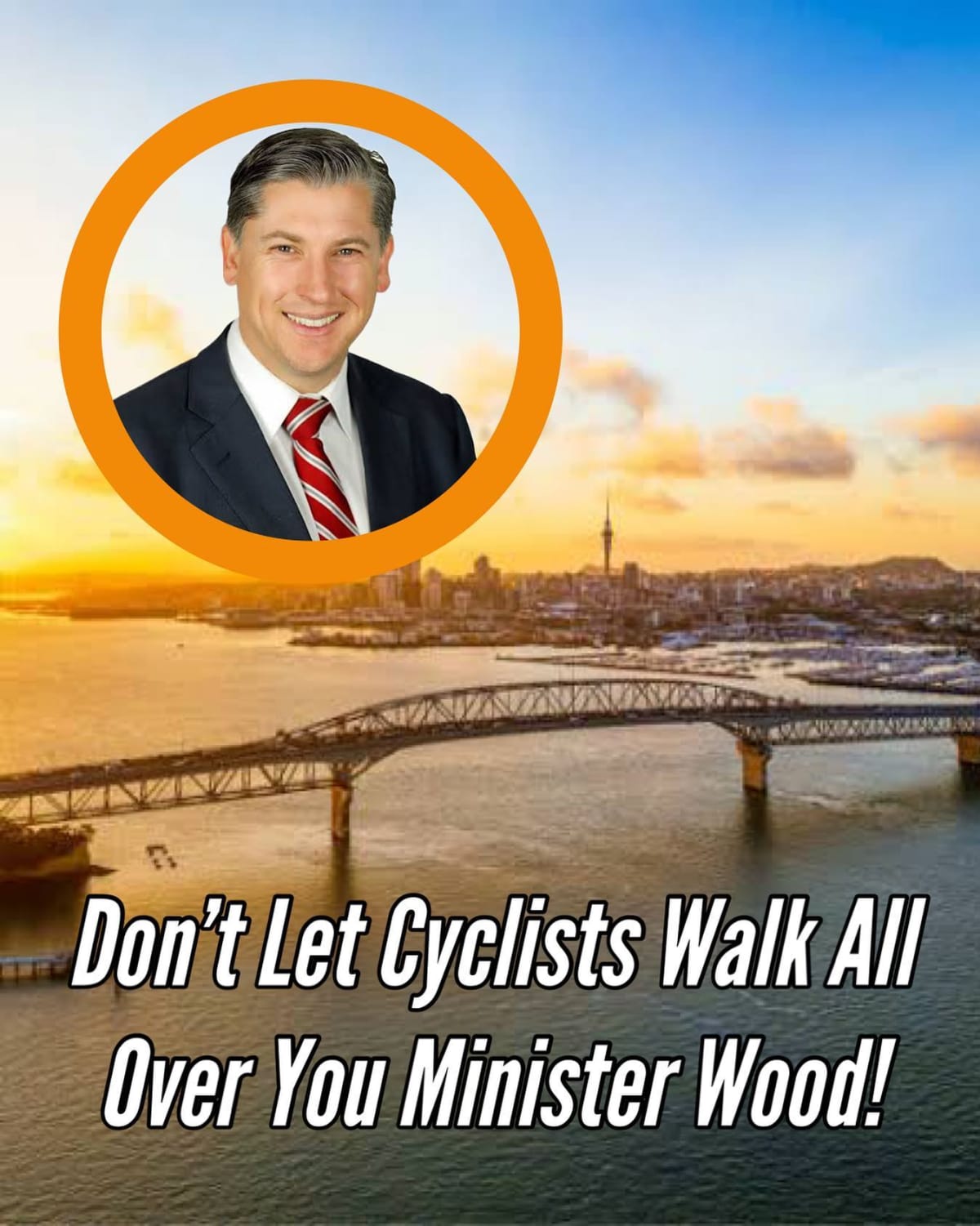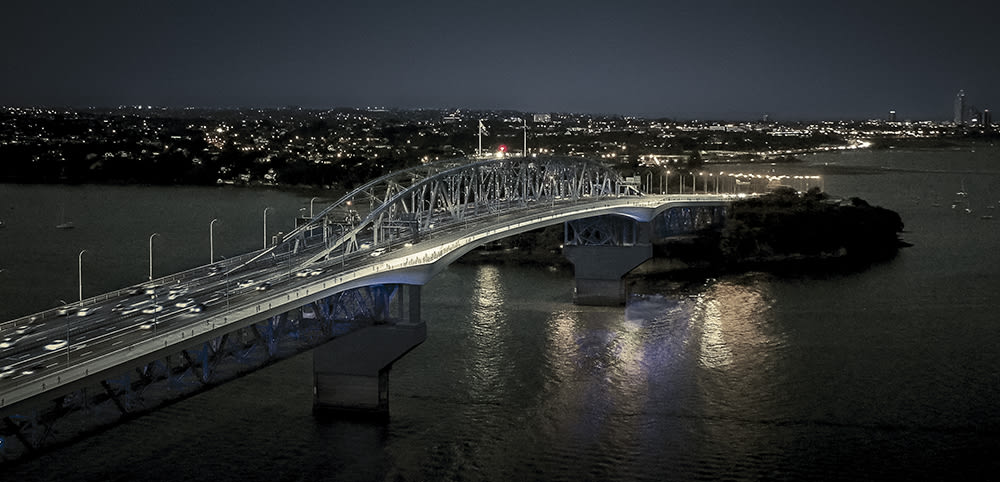
Controversies around the scrapped trial of a dedicated cycling and walking lane on the Auckland Harbour Bridge has come to a head with legal threats from activists to the transport agency
Cycling advocates say Waka Kotahi is wrong not to trial a dedicated walking and cycling lane across Auckland's harbour.
Alternative transport advocates are accusing the transport agency of being illegal, unfair and unreasonable in its initial consideration of advice on whether to go ahead with a trial of opening up a lane of the Auckland Harbour Bridge to pedestrians and cyclists.
The accusations come with threats of legal action, which have been followed by promises by Waka Kotahi that the agency will reconsider the decision on Thursday of next week.
Transport advocacy group and charitable trust Movement, formerly known as SkyPath Trust, are planning to lodge an application for judicial review in the High Court challenging Waka Kotahi’s decision to shelve the lane plan.
The hearing is set for early October in the High Court in Wellington - although Movement has indicated to Waka Kotahi in a letter via its lawyer that a full reconsideration of the decision, with a number of conditions, could see the judicial review application plans rescinded.
These conditions ask the transport agency to engage with “genuinely independent experts”, “properly consult groups representing active mode transport users” and look positively at the idea of Aucklanders being able to walk or cycle across the harbour, “rather than to provide reasons why it cannot be”.
Movement contended Waka Kotahi had already made up its mind before the official decision date in December 2021, and the decision-making process was “the rigid application of pre-determined policy”.
It argued Waka Kotahi’s decision was illegal as it didn’t give proper thought to mode shift, which the transport agency itself calls positive for increased wellbeing of New Zealand’s cities - by growing the share of travel by public transport, walking or cycling.
But in its letter Movement accused the agency of favouring needs of private car owners, exemplified by the use of the term ‘customers’ for motorists, “with the obvious inference being that cyclists and pedestrians are not customers”.
In addition, Movement alleged the agency did not commission additional reports on the effect that a lane reallocation might have on carbon emissions, and the subject was conspicuously omitted from reports that were made. There had been a claim early in the process that lane reallocation would increase carbon emissions.
“That claim, although clearly absurd, does reveal all too well Waka Kotahi's willingness, from the start, to find reasons why reallocating a lane couldn't be done rather than find ways that it could be,” read the letter from Michael Lloyd, a lawyer representing Movement.
He said the agency’s assessment of the lane made errors like assuming cyclist and pedestrian trips would be equally distributed across 24 hours and comparing the average annual daily walking and cycling trips with weekday traffic demand.
The group also claimed Waka Kotahi neglected to consult the wider Auckland community on its plans and there was no consultation with Movement or Bike Auckland, which “have access to experts and a significant body of expert literature and materials particularly relating to mode shift, the benefits of trials, and the like”.
The decision to scrap the trial was unreasonable, Movement said, and “no reasonable decision maker could or should have rejected the opportunity to at least trial non carbon emitting active modes on a central link in a large city's transport network”.
In response to the letter, Waka Kotahi's lawyers Tim Smith and Anthony Wicks said the agency would discuss the request for a reconsideration at its next meeting on Thursday week.
“The Waka Kotahi Board will consider at its next board meeting the request at paragraph 72 of your letter that Waka Kotahi reconsider its decision on a trial of reallocation of lane space for active modes of transport,” they said, promising an additional response after the meeting.
Mayoral candidate Efeso Collins said he had previously stated his support for a trial of a lane for active transport options.
"We need to design our infrastructure in a way that means we're offering real choice in modes of transport, and balance in our transport options," he said. "That's an approach that will improve health outcomes, reduce our emissions, and build a city that works for us and for our children."
Mayoral candidate Leo Molloy said he would support cyclists and walkers having access to a lane on summer weekends, but didn’t agree with the cycle lobby threatening the transport minister with legal action if it didn't get a dedicated crossing on weekdays.
“Cyclists can't be selfish with the limited infrastructure we have, but we should give them and all Aucklanders the chance for summer weekends,” he said. “Cyclists need to learn to share, not threaten the transport minister.”
He shared an image of transport minister Michael Wood’s face encircled in a gold ring above an aerial view of the bridge and the words ‘Don’t Let Cyclists Walk All Over You Minister Wood!’

But transport planning consultant and Movement spokesperson Bevan Woodward said Molloy must have his wires crossed, as the group wasn't gunning for the minister, who had requested the trial of a reallocated lane in the first place. Instead, the judicial review is aimed at Waka Kotahi.
Woodward called Molloy's claim of cyclists being selfish "bizarre", and questioned why cyclists would need to learn to share a bridge that is currently 100 percent for motorists.
Molloy's pitching of cyclists against motorists was outdated thinking.
"The vast majority of adult pedestrians and cyclists own motor vehicles," he said. "This is about offering transport choice to Aucklanders and enabling us all to get where we want to quicker and more easily."
Heart of the City CEO and fellow mayoral hopeful Viv Beck shared Molloy's desire to see a lane turned over for just the odd occasion - Sunday mornings or public holidays, three or four times a year - but doesn’t want to give it up full time.
“We all want to see walking and cycling access across the Harbour, but this has to be done in a manner that does not disrupt the operations of the bridge, which has shown its lack of resilience for the 170,000 vehicle and 1,000 bus drivers who use the bridge daily,” she said. “I have reservations about the impact of re-allocating a lane and from what I have seen, don’t think it’s the right answer.”
The impacts of congestion on the bridge had ramifications for both sides of the harbour and a solution could come in the form of a second harbour crossing.
“This issue underscores the need for quicker decision-making on the new Waitemata Harbour crossing – one that provides for all modes of transport. As mayor, I’ll be calling for this to be built as soon as possible.”
Dr Michael Morris, a mayoral candidate representing Animal Justice Auckland, supported Movement, saying moves like the reallocated lane were necessary in the face of a climate emergency.
“One thing that we can do is get rid of the hegemony of the motorcar,” he said.
On the side of motorists was the Auckland Ratepayers’ Alliance, which called on Waka Kotahi to stand firm on the decision to rule out the cycleway, and appealed to North Shore councillors Richard Hills and Chris Darby to take a stand.
Alliance spokesperson Josh Van Veen said the proposal had already been ruled out, pinning the decision on impracticality and safety concerns.
"Furthermore, modelling by Waka Kotahi confirmed what every motorist knows: closing a lane of the Harbour Bridge to traffic is only going to make congestion worse. Given the unreliability of public transport, many Aucklanders depend on their cars to get over the bridge. A lane closure would unfairly punish those for whom cycling isn't a realistic option.”
The alliance would campaign vigorously against a decision to put aside the lane for alternative modes of transport.

The timeline we live in is very different - the Government scrapped the standalone component of the bridge in October of last year, and instead said the transport agency would pursue options like dedicated bike ferries and more bus lines.
At the time of the announcement, Waka Kotahi said it expected to be able to provide an update on short, medium and long-term solutions for a walking and cycling connection over the Waitematā Harbour by mid-2022.







